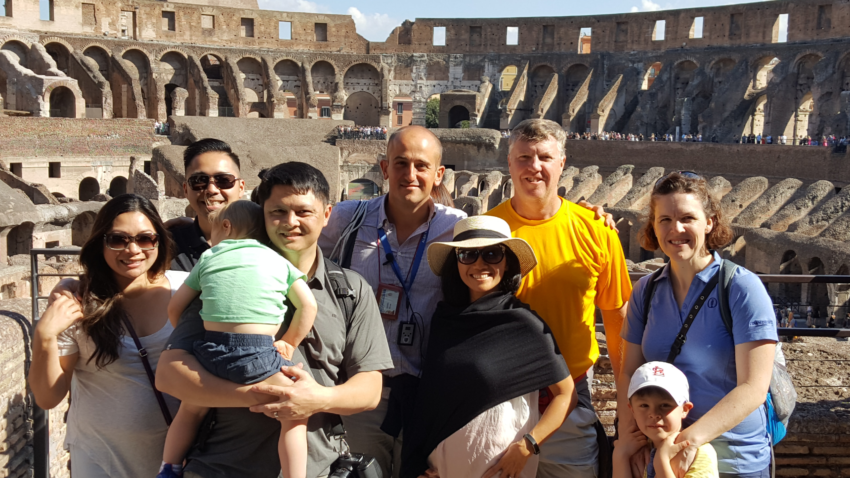Q&A: Through Eternity tour guide Luca De Angelis

I will do regular Q&As with tour guides at Through Eternity, Rome’s outstanding tour company for which I started blogging in December. Check out all its tours around the city at www.througheternitytours.com, office@througheternity.com, 1-800-267-7581, 39-06-700-9336. I’ll talk to them about insights into their jobs, their lives and Rome. This month it’s Luca De Angelis, 38, a Rome native.
WHY DID YOU WANT TO BECOME A TOUR GUIDE?
I’ve always liked very much to share information about this kind of stuff with people. When I was a little kid and in my young adult life I’d take my parents to tours of parts of Rome or archaeological ruins. Or a lot of my American friends would come over to Rome and I’d take them as their tour guide.
HOW’D YOU BECOME A TOUR GUIDE?
I just decided to get my license as a tour guide a couple of years after I got my master’s degree in archaeology in 2008. I set out for an archaeology job in Val d’Aosta for most of 2008. Then at the end of 2008 I decided to get into post-graduate school and decided to take the exam as a tour guide.
WHY IS STUDYING HISTORY IMPORTANT FOR PEOPLE VISITING ROME?
It’s impossible to understand the city unless you try to get a very, very quick grip on how the city developed and the different strata superimposed atop of each other in almost 3,000 years of history.
WHAT CAUSED THE FALL OF THE ROMAN EMPIRE?
The Roman Empire collapsed like any empire, because of several factors. They seem to be the same across civilization. One is the huge expansion of the military expense which at some point was impossible to compress, it was impossible to do without. It was a matter of keeping the integrity of the empire by trying to always keep off the empire all these barbarian populations, That was only possible with the expense of huge amounts of money. This huge expense at some point, which was impossible to avoid, triggered a vicious circle which in two centuries dropped the Roman Empire to a very, very noisy collapse.
AS AN ARCHAEOLOGIST, WHAT’S IT LIKE TO DISCOVER SOMETHING THAT OLD?
There’s not that much to look at. It’s all stuff that’s made of shapeless stones and mud and very, very perishable material. So there’s very little remaining of that which makes the discovery even more sensational and exciting. Because you have little clues here and there that are hardly visible and you have to try and fill the holes. It’s like detective work and it makes it even more challenging when you’re dealing with such old stuff.
WHAT’S THE BIGGEST MISCONCEPTION PEOPLE HAVE OF ANCIENT ROME?
Of an incredible brutal society that’s all based on sex, violence and greed. For sure it was a much more brutal society than our own society even but if you look at the last 2,000 years of the history of the world, I don’t think after the collapse of empire and the advent of Christianity that took over the West, there was a decrease in the bloodshed. Just take a look at the last century of our history. It’s continuous tragedy non stop.
WHY SHOULD PEOPLE TAKE GUIDED TOURS?
It can open for them a wider perspective for archaeologist sites because there’s very little to see and it’s hard to visualize what you’re seeing if you don’t have someone who knows his stuff, who guides you and somehow tries to weave a story out of the rock you see here and there. That’s incredibly important. Also, in museums, to look at more visual art like paintings and statues, having a guide really helps you understand the development of art and how the art process goes through the centuries which is incredibly interesting and incredibly important to be aware of and it’s very hard without a guide.
IF YOU HAD ONE TIME PERIOD TO LIVE IN ROME’S HISTORY WHEN WOULD IT BE?
Ancient Rome, for sure. I’d like to live in the time of Hadrian (117-138 AD), when Rome was this incredible construction site when they were building the Pantheon, the Temple of Venus in Rome. The empire was doing really well, in a state of relatively calm political stability and financial prosperity.
HOW DO YOU KEEP GUIDING TOURS FROM SEEMING REPETITIVE?
I constantly read new things. I’m always updating my knowledge or re-reading things I read a long time ago. I try to rotate the things that I say and I adapt to the knowledge that I think that the people I have in front of me have and their interests.


February 26, 2017 @ 6:27 pm
Hello Again John,
Thank you once again for another excellent article. I have a question I’d like to ask you to discuss with Luca. If he could read one book regarding the history of the Roman Empire what would it be?
Grazie,
Rick
February 27, 2017 @ 3:07 am
Thanks, Rick. I’ll ask him today.
February 28, 2017 @ 6:00 pm
Thanks John